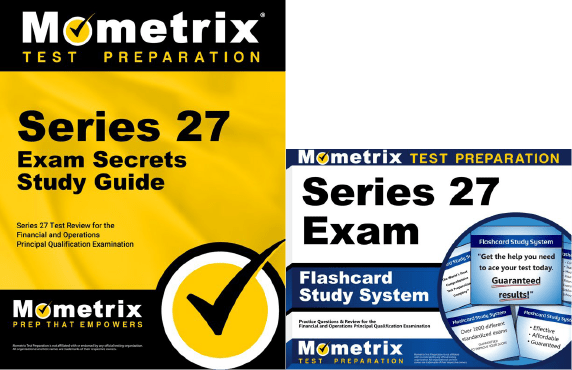Welcome to this overview of the Series 27 exam!
If you need help studying for the Series 27 exam or just want some more information about what the test is like, you’ve come to the right place.
Test Eligibility
Before you can register to take the Series 27 exam, you’ll need to be sponsored by either a FINRA member firm or an SRO member firm.
Once you’ve confirmed sponsorship, you’re set to begin the registration process!
What’s on the Series 27 Exam?
First, let’s talk about the questions on the test. There are 155 multiple-choice questions total, but only 145 of the questions will count toward your score. Why is that?
The 10 unscored questions on the Series 27 exam are called “pretest” questions. These are added to the tests to determine if they’re good enough questions to add to future versions of the test.
The trick is that you won’t have any way of knowing which questions are scored and which ones are pretest. They will appear just like the scored questions throughout the test.
The time limit for the exam is 3 hours and 45 minutes. There aren’t any scheduled breaks, but you’re free to take restroom breaks as needed.
Let’s take a closer look at the different sections of the Series 27 exam.
1. Financial Reporting
25 scored questions
- Preparing and reviewing the accuracy of financial statements
- Compiling, reviewing, and filing FOCUS and supplemental reports
- Managing audited financials with appropriate regulatory bodies
- Filing regulatory notifications
- Disclose regulatory and operational impact of material transactions
2. Operations, General Securities Industry Regulations, and Preservation of Books and Records
42 scored questions
- Managing and reviewing general operations functions
- Preparing and preserving financial records
- Fundamental regulatory and industry knowledge
3. Customer Protection
24 scored questions
- Determining possession/control of customer securities
- Preparing customer reserve computation
- Preparing proprietary account of a broker-dealer reserve computation
- Funding the reserve bank account
- Determining and monitoring a claim for exemption
4. Net Capital
41 scored questions
- Determining the minimum net capital requirement
- Calculating aggregate indebtedness
- Reviewing the trial balance to determine allowable assets
- Determining net worth adjustments
- Reviewing operational reports
- Applying haircut deductions
- Computing net capital in compliance with SEA 15c3-1
5. Funding and Cash Management
13 scored questions
- Managing and reviewing margin activity
- Assessing a firm’s regulatory funding for business operations
How to Register
Once you’ve ensured that you meet all of the eligibility requirements, your firm will register you for the exam via the CRD program.
Exam Scores
The test is scored using the Angoff method. Here’s how it works:
The Angoff method involves a group of subject-matter experts taking an educated guess at the percentage of candidates who would correctly answer each question on the test. These estimates are then averaged to set a cut-off score, which test-takers must meet or exceed to pass.
This method aims to ensure the pass threshold reflects the level of knowledge or skill that is deemed minimally acceptable for a particular profession or field.
Retaking the Exam
If you didn’t get a passing score on your first try, that’s okay! You can retake the test after a 30-day waiting period.
Keep in mind that you will have to pay the full testing fee every time you retake the test.
FAQs
How many questions are on the Series 27 exam?
The exam contains 155 questions.
How long is the Series 27 exam?
The time limit is 3 hours and 45 minutes.
What is the passing score for the Series 27 exam?
You’ll need to get a final score of at least 69 to pass.
How much does the Series 27 exam cost?
The testing fee is $235.
Mometrix Test Preparation is not affiliated with or endorsed by any official testing organization. All organizational and test names are trademarks of their respective owners.



 Series 27 Study Guide
Series 27 Study Guide Series 27 Flashcards
Series 27 Flashcards